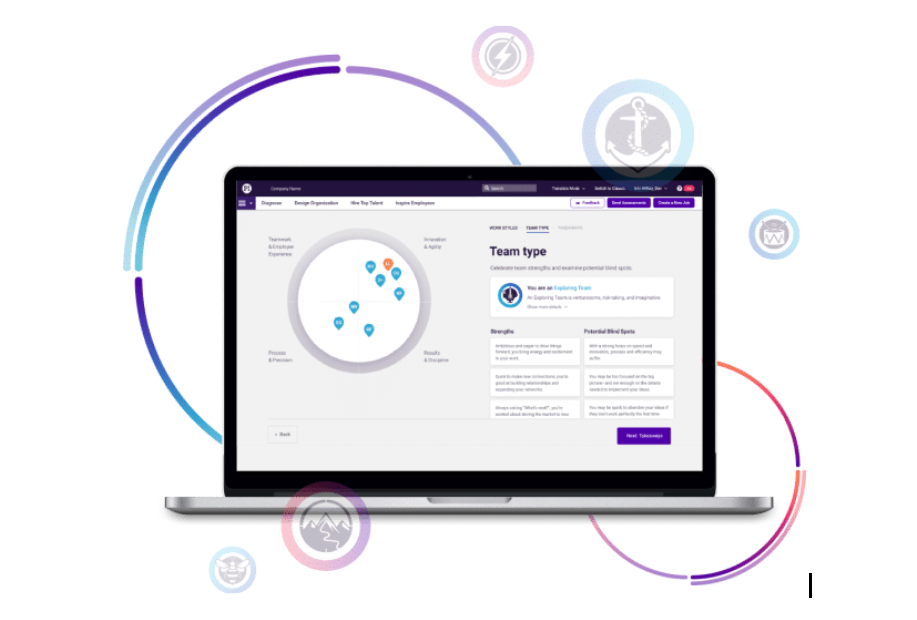Introducing Team Discovery: What Kind of Team Are You?
By Jennifer Lahey |
2.7 min read

As an organization, team cohesion is essential to being successful as a business. How do you do this? Every team is different in its own way. Once you first understand what type of team you have, you can then begin to dive into the world of talent optimization.
With The Predictive Index new software feature, Team Discovery, you can determine your Team Type to identify your team’s blind spots, strengths, and strategies for action items and takeaways. You might find yourself asking, how does this work? Let’s jump into the science behind team discovery.
Origins Behind Team Types
In 2019, The Predictive Index conducted a large-scale study using over 125,000 Behavioural Assessment results from over 20,000 teams. The study resulted in evidence for nine distinct Team Types based on the behavioural make-up of their members.
The same work that built the foundation for the four core factors of the Predictive Index Behavioural Assessment, a scientifically validated psychometric tool for hiring, helped in building the concept for the team discovery tool.
How do the nine Team Types work?
Based upon the overall behavioural emphasis of its members, a team type is built by using the factors received from rank scores. Based on their value, the sums of these ranks are added into individual quadrant scores based on the Interpretation of the Competing Values Framework for organization design and culture. PI considers the scores in aggregate with Team Type determined by the overall emphasis of the team, therefore quadrants with at least 30% alignment with the behavioural results across the team are considered to be the most descriptive of the team’s culture.
What are the origins of team strategic emphasis?
The strategies and team objectives section of the team discovery tool were based on the Quinn & Rohrbaugh Competing Values Framework, a tool used for describing the organizational effectiveness of culture. PI’s Science team conducted a literature review and test development process that ensured the objectives were sound and representative of the proposed quadrants based on the four core factors pulled from the PI Behavioural Assessment.
How does it all come together?
The combination of Team Types and strategic emphasis tells us about a team’s culture, values, and natural strengths whereas strategic emphasis tells us about a team’s goals and objectives. The Team Discovery tool can reveal answers to questions such as:
- How can we leverage our team’s natural strengths?
- Where are our gaps when it comes to achieving our objectives?
- How can we leverage this tool to better identify our strategies as a team?
- What does each team member bring to the table with respect to these strengths and gaps?
The Predictive Index Team Discovery Tool is a scientifically validated tool that uses theoretical and empirical scientific findings to produce insights and recommendations actions you can use to optimize your team’s cohesion and performance.
Interested in seeing how the Team Discovery tool works in action? Reach out to your Managing Principal consultant to set up a demo with our Shared Services team or register for our free Team Discovery walkthrough happening on April 15th from 1:00-2:00 p.m. here.
Related Blogs
Top 20 Questions to Ask your Boss
Top 20 Questions to Ask Your Boss—Backed by The Predictive Index Whether you're stepping into a new role, joining a fresh team, or just aiming to build a stronger relationship with your current
What Are Leadership Best Practices?
Leadership Best Practices Relating to The Predictive Index: Insights from Predictive Success Effective leadership is the bedrock of any successful organization. Leaders are the visionaries who guide their teams, the decision-makers who drive change, and
What Is The Meaning of Emotional Capacity & How to Best Build It?
What Is the Meaning of Emotional Capacity & How to Best Build It? Emotional capacity is the ability to manage emotions effectively, understand the emotions of others, and remain resilient in the face of stress


